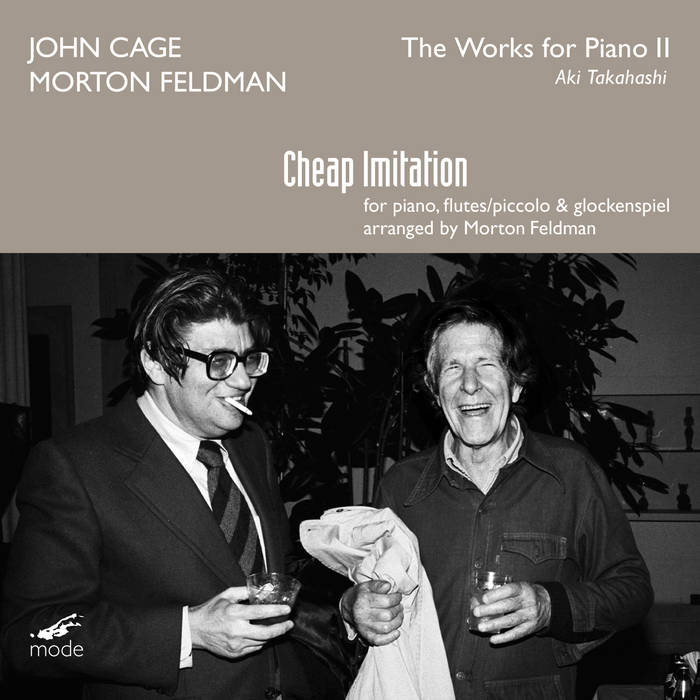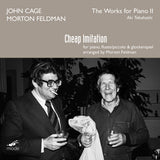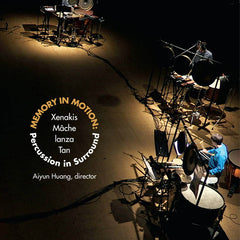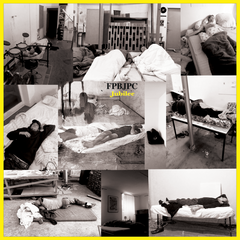John Cage // Complete Cage Edition 54: The Works for Piano 11: Cheap Imitation CD
- Availability:
John Cageが1969年にErik Satieの「Socrate」に影響を受け制作した作品「Cheap Imitation」をMorton Feldmanが1980年に編曲し、その楽譜を髙橋アキにプレゼントした結果リリースに至ったという縁が縁を呼んだ作品です。Cageの友人であるピアニストJames Pritchettによるライナーノートが付属。以下、レーベル解説です。
”ケージは、マース・カニングハムの振付のために、エリック・サティの「 Socrate」を2台のピアノでトランスクリプションすることになっていたが、出版社の許可を得ることができず、演奏権すら得られなかった。そこでケージがとった解決策は、「 Socrate」の旋律やフレーズの構成をそのままに、著作権の問題を避けるために音符を変えたピアノ曲を作ることだった。この曲をケージは「Cheap Imitaion」と名付けた。これに対してカニンガムは、自分のダンスを「セカンド・ハンド」と呼んだ。
このリサイタルは、サティの影響下にある3つの短編作品で完結する。「Perpetual Tango」は、サティの「Sports et Divertissements」の「タンゴ」の楽章から派生しており、元のタンゴのリズムを取り、その一部を消してしまうというもの。ケージは音程を指定せず、原曲の音域を与えている。ピアニストは与えられたリズムの中でどの音程を弾くかを選ぶ。1989年には、『Sports et diver- tissements』に収録されている別の曲『The swing』にも同じ手法を適用し、『Swinging』というタイトルをつけた。
「All sides of the small stone...」は、サティの「Gymnopedies」から派生した、まったく歴史のわからない曲である。アメリカの作曲家ジェームス・テニーの作品の楽譜の裏に書かれた1ページの音楽原稿には、"John "というサインと "7/78 "という日付が記されているだけである。この原稿は、テニーの死後、彼の書類を整理しているときに発見されたものである。ケージの作品とされているが、筆跡は彼のものとは思えない。ケージもテニーも、そして他の誰もがこの作品について一言も語っていないので、作曲者は謎のままである。高橋アキはこの未発表作品を初めて録音した。"
レーベルその他作品はこちら /// Click here to see more Mode releases available at Tobira.
----------------------------
Description by Mode:
" CAGE – SATIE – FELDMAN – TAKAHASHI sums up the focus of this album. All of these works by Cage are influenced by Satie. Cage’s friend and colleague Morton Feldman made an arrangement of Cage’s solo piano “Cheap Imitation” for a trio of piano, flutes/piccolo and glockenspiel. Feldman’s admiration for the pianist Aki Takahashi caused him to gift this arrangement to her. And, full circle, we have the repertoire of this album.
The major discovery is Feldman’s arrangement of Cheap Imitation for this very Feldmanesque instrumental ensemble. It is unknown why Feldman made this arrangement in 1980. Knowing of Takahashi’s reputation as a pianist specializing in new music, Feldman had invit- ed her to be an artist in residence at the university where he taught.
When she was leaving, Feldman gave a musical score to Takahashi as a gift. It was a copy of John Cage’s solo piano piece Cheap Imitation with annotations by Feldman. He told her that this was an instrumen- tal version of this piece: flute, piano, and glockenspiel. He signed the title page, just under the original title:
INSTRUMENTAL VERSION (Fl, Pf, Glock) Morton Feldman
Buffalo, N.Y. Winter 1980
Dedicated to Aki Takahashi
Cage was to create a two-piano transcription of Erik Satie’s Socrate for a Merce Cunningham choreography, but he was unable to get permission from the publisher. Even worse, he could not even get performance rights to use the published piano-vocal score of Socrate. Cage’s creative solution was to make a piano piece that maintained the exact metrical and phrase structure of Socrate, but with different notes to avoid copyright issues. He called this piece Cheap Imitation. Cunningham responded by calling his dance Second Hand.
The recital is completed by three short works under Satie’s influence. Perpetual Tango is derived from the “Tango” movement of Satie’s Sports et divertissements. Cage’s method was to take the rhythm of the original tango and erase parts of it. He does not specify pitches, but instead gives the pitch ranges of the original piece. The pianist chooses which pitches to play in the rhythm given. In 1989 he applied the same procedure on another piece from Sports et diver- tissements, “The swing;” he titled the result Swinging.
All sides of the small stone... is a composition with a completely unknown history, derived from Satie’s Gymnopédies. All we have is a page of musical manuscript written in the back of a score of a work by American composer James Tenney with the signature “John” and the date “7/78.” The manuscript was discovered when Tenney’s papers were being organized after his death. It has been attributed to Cage, but the handwriting doesn’t look like his. Neither Cage nor Tenney—nor anyone else, for that matter—said a word about this piece, so its definitive composer will remain a mystery. Aki Takahashi gives the first recording of this unpublished work.
Liner notes by James Pritchett. "
Artist : John Cage
Label : Mode Records
John Cageが1969年にErik Satieの「Socrate」に影響を受け制作した作品「Cheap Imitation」をMorton Feldmanが1980年に編曲し、その楽譜を髙橋アキにプレゼントした結果リリースに至ったという縁が縁を呼んだ作品です。Cageの友人であるピアニストJames Pritchettによるライナーノートが付属。以下、レーベル解説です。
”ケージは、マース・カニングハムの振付のために、エリック・サティの「 Socrate」を2台のピアノでトランスクリプションすることになっていたが、出版社の許可を得ることができず、演奏権すら得られなかった。そこでケージがとった解決策は、「 Socrate」の旋律やフレーズの構成をそのままに、著作権の問題を避けるために音符を変えたピアノ曲を作ることだった。この曲をケージは「Cheap Imitaion」と名付けた。これに対してカニンガムは、自分のダンスを「セカンド・ハンド」と呼んだ。
このリサイタルは、サティの影響下にある3つの短編作品で完結する。「Perpetual Tango」は、サティの「Sports et Divertissements」の「タンゴ」の楽章から派生しており、元のタンゴのリズムを取り、その一部を消してしまうというもの。ケージは音程を指定せず、原曲の音域を与えている。ピアニストは与えられたリズムの中でどの音程を弾くかを選ぶ。1989年には、『Sports et diver- tissements』に収録されている別の曲『The swing』にも同じ手法を適用し、『Swinging』というタイトルをつけた。
「All sides of the small stone...」は、サティの「Gymnopedies」から派生した、まったく歴史のわからない曲である。アメリカの作曲家ジェームス・テニーの作品の楽譜の裏に書かれた1ページの音楽原稿には、"John "というサインと "7/78 "という日付が記されているだけである。この原稿は、テニーの死後、彼の書類を整理しているときに発見されたものである。ケージの作品とされているが、筆跡は彼のものとは思えない。ケージもテニーも、そして他の誰もがこの作品について一言も語っていないので、作曲者は謎のままである。高橋アキはこの未発表作品を初めて録音した。"
レーベルその他作品はこちら /// Click here to see more Mode releases available at Tobira.
----------------------------
Description by Mode:
" CAGE – SATIE – FELDMAN – TAKAHASHI sums up the focus of this album. All of these works by Cage are influenced by Satie. Cage’s friend and colleague Morton Feldman made an arrangement of Cage’s solo piano “Cheap Imitation” for a trio of piano, flutes/piccolo and glockenspiel. Feldman’s admiration for the pianist Aki Takahashi caused him to gift this arrangement to her. And, full circle, we have the repertoire of this album.
The major discovery is Feldman’s arrangement of Cheap Imitation for this very Feldmanesque instrumental ensemble. It is unknown why Feldman made this arrangement in 1980. Knowing of Takahashi’s reputation as a pianist specializing in new music, Feldman had invit- ed her to be an artist in residence at the university where he taught.
When she was leaving, Feldman gave a musical score to Takahashi as a gift. It was a copy of John Cage’s solo piano piece Cheap Imitation with annotations by Feldman. He told her that this was an instrumen- tal version of this piece: flute, piano, and glockenspiel. He signed the title page, just under the original title:
INSTRUMENTAL VERSION (Fl, Pf, Glock) Morton Feldman
Buffalo, N.Y. Winter 1980
Dedicated to Aki Takahashi
Cage was to create a two-piano transcription of Erik Satie’s Socrate for a Merce Cunningham choreography, but he was unable to get permission from the publisher. Even worse, he could not even get performance rights to use the published piano-vocal score of Socrate. Cage’s creative solution was to make a piano piece that maintained the exact metrical and phrase structure of Socrate, but with different notes to avoid copyright issues. He called this piece Cheap Imitation. Cunningham responded by calling his dance Second Hand.
The recital is completed by three short works under Satie’s influence. Perpetual Tango is derived from the “Tango” movement of Satie’s Sports et divertissements. Cage’s method was to take the rhythm of the original tango and erase parts of it. He does not specify pitches, but instead gives the pitch ranges of the original piece. The pianist chooses which pitches to play in the rhythm given. In 1989 he applied the same procedure on another piece from Sports et diver- tissements, “The swing;” he titled the result Swinging.
All sides of the small stone... is a composition with a completely unknown history, derived from Satie’s Gymnopédies. All we have is a page of musical manuscript written in the back of a score of a work by American composer James Tenney with the signature “John” and the date “7/78.” The manuscript was discovered when Tenney’s papers were being organized after his death. It has been attributed to Cage, but the handwriting doesn’t look like his. Neither Cage nor Tenney—nor anyone else, for that matter—said a word about this piece, so its definitive composer will remain a mystery. Aki Takahashi gives the first recording of this unpublished work.
Liner notes by James Pritchett. "
Artist : John Cage
Label : Mode Records






